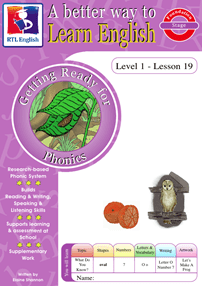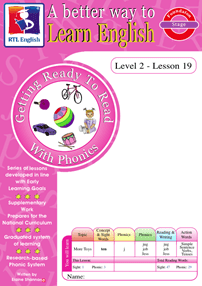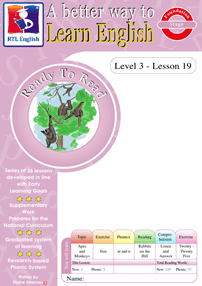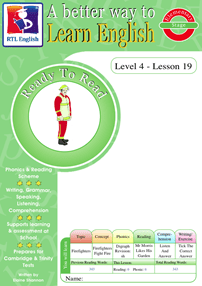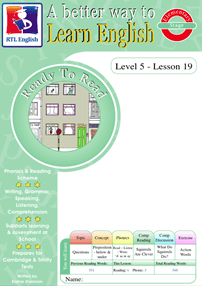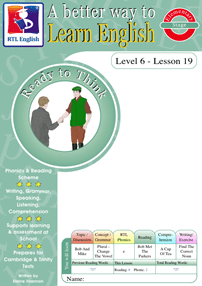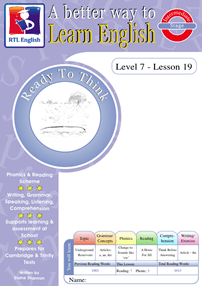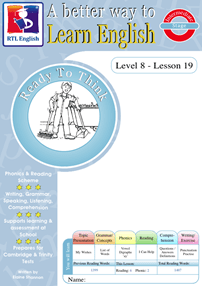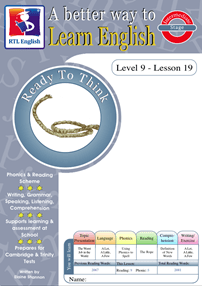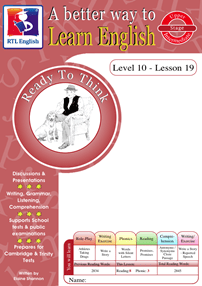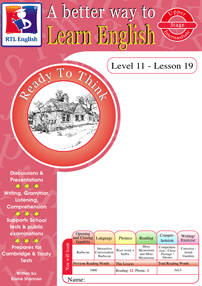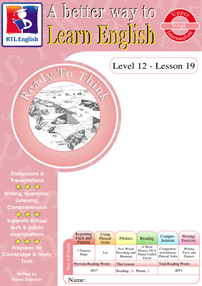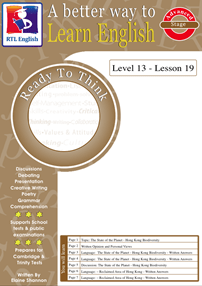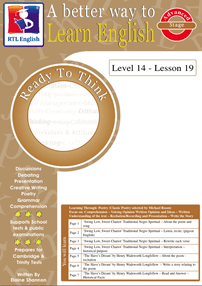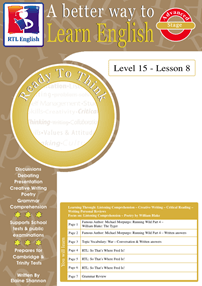English lessons for kids in Peoria, Illinois

For several decades, RTL English has been taught in schools, tutorial centres & at home both as part of the curriculum & as a supplementary activity. RTL English is growing in popularity worldwide, so why not join hundred of thousands of parents, tutors & teachers around the globe & teach your son or daughter RTL English today?
Teaching your child to use English competently might very well be the key to his or her success in school in Illinois, in exams, in his or her career & beyond.
Teaching English to your son or daughter might be the key, not only to their success in school in Peoria, but also their sense of self-worth, both in Illinois and beyond.
Elaine Shannon, Author & Curriculum Designer Tweet
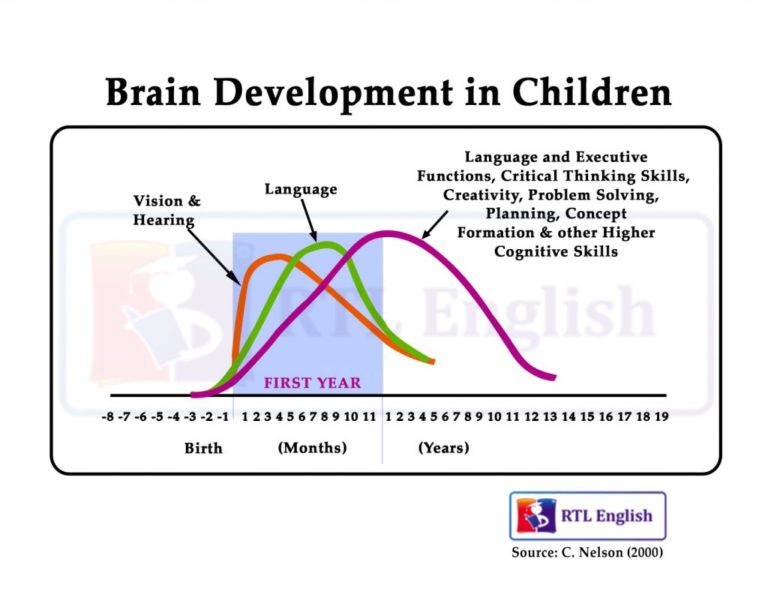
- Early & advanced English skills will make your child smarter.
- Early & advanced English skills will improve problem solving.
- Early & advanced English skills will improve planning, & abstract thinking skills.
- Early & advanced English skills will help develop complex idea comprehension.
- Early reading can help children compensate for modest levels of ability in other areas. (*Ref)
ON A PRACTICAL LEVEL, HOW IMPORTANT IS EARLY READING?
- Your child’s reading ability & vocabulary at 3 years old might predict his or her success in school in Peoria when they are 6 to 7 years old (*Ref).
- Your child’s reading ability at 6 to 7 years old might predict their success at 17 to 18 years old (*Ref)!
- Your child’s reading ability at 7 to 8 years old might determine his or her graduation from senior school in Peoria (*Ref).
ON THE OTHER HAND:
- Children who can’t read competently by 7 to 8 years old are four times more likely to leave school without a diploma/results than proficient readers (*Ref).
and:
- Children who are not taught Phonemic Awareness, and therefore have to rely on memory have difficulty beginning to read and continue to have difficulty with new words.
BUT, SURELY SCHOOL WILL TEACH MY CHILD TO READ? SO, WHY DO I NEED TO BOTHER?
If this is what you are thinking, then you should know that you cannot rely on schools, including those in Peoria …
- In the USA, almost 70% of children at school who are aged 9-10 years old cannot read proficiently (*Ref)!
- And, of those children, 33% of them read at only a very basic level, & 34% are reading at a very poor level (*Ref).
- It’s not so different in the UK, where over 100,000 children leave school illiterate(*Ref).
- Or in Australia, where 33% of students aged 11 years old fail to meet literacy benchmarks (*Ref).
- Or in Canada, where 42% of the entire adult population is only semi-illiterate (*Ref).
NO, YOU CANNOT RELY ON SCHOOLS.
But, why not?
- Teachers don’t always understand the basic units of language and reading
- Teachers often don’t know how to teach English language concepts
- There just aren’t enough qualified teachers
- Classes are too large
- Kids don’t get enough 1-on-1 attention from teachers in the classroom
- Schools aren’t using the correct teaching systems – i.e they rely on rote learning or sight words
- Schools are overwhelmed & have tried to shift some of the burden of teaching onto apps and computers
UNFORTUNATELY, IT IS A FACT THAT:
Being illiterate is a guaranteed ticket to a dead end.
YOU NEED TO TAKE CHARGE OF YOUR CHILD’S EDUCATION – TODAY!
BUT HOW?
You can begin by teaching English to your child.
By Teaching your son or daughter to read your son or daughter will develop early reading skills that will help put them years ahead of other children in Illinois. So, if you’ve decided that you want to become a proud parent of a happy and smart child, then you owe it to your child to teach them to read and improve their English.
WE HELP PARENTS TEACH ENGLISH TO CHILDREN
RTL English™ offers 600 easy-to-teach & downloadable English lessons for parents to teach to his or her child at home. Our lesson workbooks will enable your child to catch up, keep up & get ahead! Our lessons also challenge more advanced students; so whatever your son or daughter’s ability, there’s sure to be an RTL English lesson workbook that’s suitable for them.
THE RTL ENGLISH CURRICULUM CONSISTS OF 15 YEARS (LEVELS) OF TEACHING MATERIALS WHICH INCLUDE SIX HUNDRED LESSON WORKBOOKS COMPRISED OF 4,000 WORKSHEETS AND NINETEEN THOUSAND TEACHING INSTRUCTIONS AND WILL SAVE YOU OVER TWO THOUSAND DAYS OF LESSON PREPARATION TIME!
Foundation Stage
Includes Level 1, 2 & 3.
Suitable for kids aged 3-6 years old in Peoria, Illinois
Elementary Stage
Includes Level 4, 5 & 6.
Suitable for kids aged 6-9 years old in Peoria, Illinois
Intermediate Stage
Includes Level 7, 8 & 9.
Suitable for kids aged 9-12 years old in Peoria, Illinois
Upper Intermediate Stage
Includes Level 10, 11 & 12.
Suitable for kids aged 12-15 years old in Peoria, Illinois
Advanced Stage
Incl. Level 10, 11 & 12.
Suitable for kids aged 15-18 years old in Peoria, Illinois
Winning Awards Since 1996
With 24 years of research, development, dedication and experience, RTL English is committed to offering the best possible start to English language learners worldwide. RTL English is part of the Ready To Learn group, an international educational organisation with students worldwide.
Elaine Shannon founded Ready To Learn in 1996, and is an internationally respected author, language expert and School Principal with more than 40 years of specialist experience. Elaine & her team of instructional designers, linguists and educational experts developed the RTL English Curriculum.
What Happens In A Lesson?
- Each lesson is designed to last approximately 60 minutes. Normally, your child will spend 55 minutes participating in learning activities, and 5 minutes completing an achievement exercise that’s used to reinforce the lessons’ learning designs & objectives.
- Each lesson is accompanied by an RTL English lesson workbook. The workbook consists of six worksheets of instructional content and one reinforcement exercise page.
- You will use the workbook & teaching notes to guide and lead your child through the variety of learning activities in the workbook.
- Although all of our workbooks follow a similar format, each one is slightly more challenging than the last in the sequence. As a result, your child will be able to advance in small manageable steps & acquire English language skills that will last them a lifetime.
- There are 5 learning stages, 15 learning levels and 600 lessons in the RTL English curriculum.
- Your child will need to complete 36 lessons to finish one learning level – which lasts approximately 1 academic year.
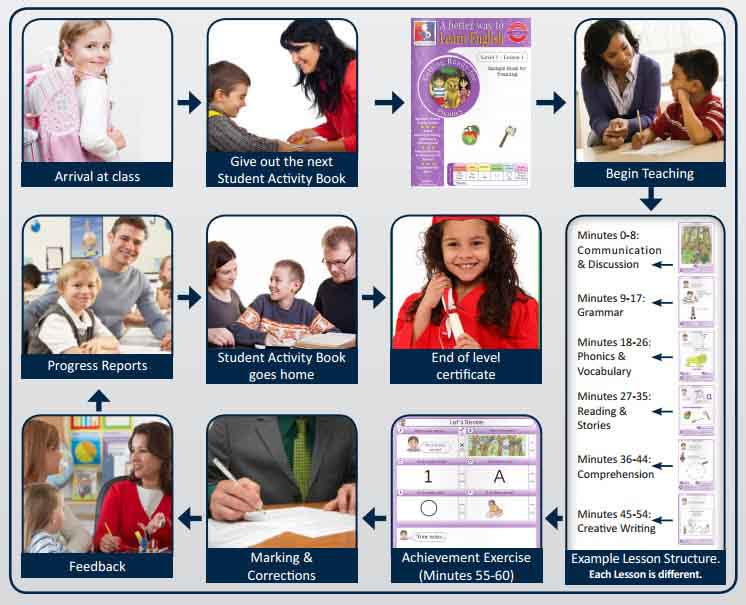
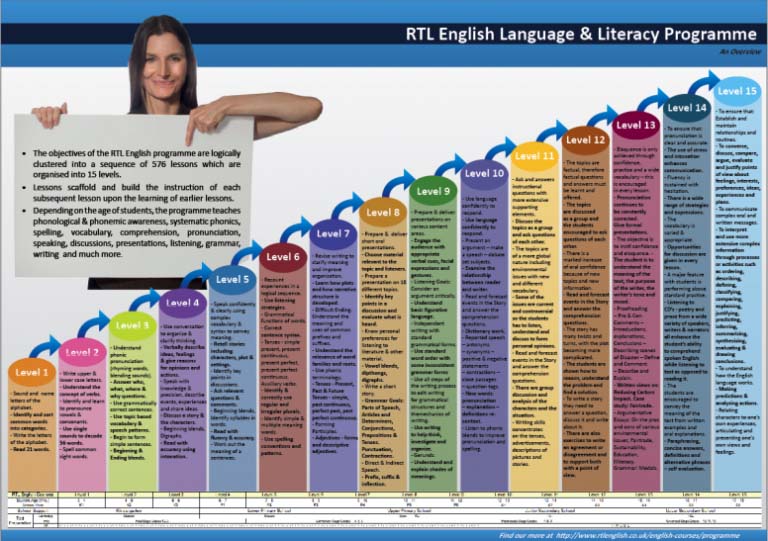
What Will My Child Be Taught?
It depends on your child’s age and their English language ability. To find out what your child will be taught, please click the grey button & then click the book cover that’s closest to your child’s current age → Lesson Workbooks
The RTL English Curriculum teaches all the communicative functions and language forms your child will need to succeed in school, exams and beyond, including:
- Phonemic Awareness
- Alphabetic Principle
- Systematic & Explicit Phonics
- Fluency with Text
- Proficient Grammar Knowledge
- Creative Writing
- Expanded Vocabulary
- Advanced Comprehension, and
- Confident Speaking Skills
The RTL English Curriculum: Kids 3 to 18 Years Old
Whatever your son or daughter’s age or English language ability, there is sure to be an RTL English course (aka ‘level’) that will help your child learn or improve their English. This is because our curriculum provides 15 years of learning for child aged 3 to 18 years old and teaches all the communicative functions & language forms your child will need to have a richer, more successful educational experience. RTL English will also supplement your child’s learning at their school in Peoria.
The RTL English Curriculum consists of 15 years (levels) of teaching materials which include 600 workbooks (comprising 4,000 worksheets & 19,000 teaching notes) and saves over 2,000 days of preparation time.Level 1
Kids: 3-4 years old
36 lessons. 36 workbooks. 252 worksheets. 1134 teaching instructions.
Level 2
Kids: 4-5 years old
36 lessons. 36 workbooks. 252 worksheets. 1134 teaching instructions.
Level 3
Kids: 5-6 years old
36 lessons. 36 workbooks. 252 worksheets. 1134 teaching instructions.
Level 4
Kids: 6-7 years old
36 lessons. 36 workbooks. 252 worksheets. 1134 teaching instructions.
Level 5
Kids: 7-8 years old
36 lessons. 36 workbooks. 252 worksheets. 1134 teaching instructions.
Level 6
Kids: 8 -9 years old
36 lessons. 36 workbooks. 252 worksheets. 1134 teaching instructions.
Level 7
Kids: 9-10 years old
36 lessons. 36 workbooks. 252 worksheets. 1134 teaching instructions.
Level 8
Kids: 10-11 years old
36 lessons. 36 workbooks. 252 worksheets. 1134 teaching instructions.
Level 9
Kids: 11-12 years old
36 lessons. 36 workbooks. 252 worksheets. 1134 teaching instructions.
Level 10
Teens: 12-13 years old
36 lessons. 36 workbooks. 252 worksheets. 1134 teaching instructions.
Level 11
Teens: 13-14 years old
36 lessons. 36 workbooks. 252 worksheets. 1134 teaching instructions.
Level 12
Teens: 14-15 years old
36 lessons. 36 workbooks. 252 worksheets. 1134 teaching instructions.
Level 13
Teens: 15-16 years old
36 lessons. 36 workbooks. 252 worksheets. 1134 teaching instructions.
Level 14
Teens: 16-17 years old
36 lessons. 36 workbooks. 252 worksheets. 1134 teaching instructions.
Level 15
Teens: 17-18 years old
8 lessons. 8 workbooks. 56 worksheets. 252 teaching instructions.
Can I See A Lesson Workbook?
There are 600 workbooks like the one below. Lesson 19, Level 1 below suits children between 3 and 4 years old. To see an example of a lesson workbook that is likely to suit your child, please click the grey button & then click the book cover that’s closest to your child’s current age → Lesson Workbooks
What Method Do You Use?
- We teach using a Step-by-Step method. The content of each lesson is determined by an 8-page workbook that’s slightly more challenging than the last in the sequence. Lessons ‘scaffold’ and build upon the learning of the previous lesson. As a result, students advance in small, manageable steps and acquire English language skills that enable them to achieve better results in school, exams & beyond..
- Sequenced instruction is organised into 5 developmentally appropriate stages, 15 levels of increasing difficulty and 600 lessons. Each lesson provides one hour of learning per week and follows a workbook that consists of six worksheets with instructional content and one reinforcement exercise page.:
- Each lesson is accompanied by a workbook follows a similar plan:
- Page 1 :: Communication/ Discussion/ Topic orientated
- Page 2 :: Grammar/ Language
- Page 3 :: Phonics/ Vocabulary
- Page 4 :: Reading (Ongoing Story)
- Page 5 :: Story Comprehension/ Language
- Page 6 :: Grammar/ Language Exercise
- Page 7 :: Achievement Exercise / Assessment
- Depending on your child’s age and their English skills, instruction will typically consist of a variety of activities including speaking, listening, letter-sound correspondence, sight words, guided oral reading, text comprehension, creative writing, grammar and critical thinking.
- You don’t need to prepare anything or create teaching materials for an RTL English lesson. It’s all been done for you. Each page of this workbook contains teaching notes to enable you to guide and lead your child through the learning activities. Once your son or daughter has finished their lesson, record their achievements in the progress report form and then simply print the next workbook in the sequence.
Will My Child Learn Phonics?
- Yes! We teach synthetic & analytical phonics which includes 44 basic phonemes, 22 beginning blends and 15 ending blends.Our students learn and practise phonics throughout our Foundation, Elementary, Intermediate and Upper Intermediate stages. Our Advanced stage uses phonics to teach pronunciation.
- We pay particular attention to blended consonant sounds (that are located at the beginning and end of many words). We teach vowels first and then consonants. As soon as possible we teach children to read. In practice this means after students have learnt 5 vowel sounds and 2 consonants they can read a few words by themselves. Children are also taught how to decode words, so from the very beginning they can see new simple words and know how to read them.
Illinois ( IL-ə-NOY) is a disclose in the Midwestern and Great Lakes regions of the United States. It has the fifth largest terrifying domestic product (GDP), the sixth largest population, and the 25th largest land area of all U.S. states. Illinois has been noted as a microcosm of the whole United States. With Chicago in northeastern Illinois, small industrial cities and immense agricultural productivity in the north and middle of the state, and natural resources such as coal, timber, and petroleum in the south, Illinois has a diverse economic base, and is a major transportation hub. The Port of Chicago connects the divulge to international ports via two main routes: from the Great Lakes, via the Saint Lawrence Seaway, to the Atlantic Ocean and from the Great Lakes to the Mississippi River, via the Illinois River, through the Illinois Waterway. The Mississippi River, the Ohio River, and the Wabash River form parts of the boundaries of Illinois. For decades, Chicago's O'Hare International Airport has been ranked as one of the world's busiest airports. Illinois has long had a reputation as a bellwether both in social and cultural terms and, through the 1980s, in politics.
The capital of Illinois is Springfield, which is located in the central ration of the state. Although today Illinois's largest population center is in its northeast, the state's European population grew first in the west as the French approved lands close the Mississippi River, when the region was known as Illinois Country and was allowance of New France. Following the American Revolutionary War, American settlers began arriving from Kentucky in the 1780s via the Ohio River, and the population grew from south to north. In 1818, Illinois achieved statehood. Following increased billboard activity in the Great Lakes after the construction of the Erie Canal, Chicago was incorporated in the 1830s upon the banks of the Chicago River at one of the few natural harbors on the southern section of Lake Michigan. John Deere's invention of the self-scouring steel plow turned Illinois's wealthy prairie into some of the world's most productive and essential farmland, attracting immigrant farmers from Germany and Sweden. The Illinois and Michigan Canal (1848) made transportation together with the Great Lakes and the Mississippi River valley faster and cheaper, and supplementary railroads carried immigrants to new homes in the country's west and shipped commodity crops to the nation's east. The permit became a transportation hub for the nation.
By 1900, the increase of industrial jobs in the northern cities and coal mining in the central and southern areas attracted immigrants from Eastern and Southern Europe. Illinois was an important manufacturing middle during both world wars. The Great Migration from the South acknowledged a large community of African Americans in the state, including Chicago, who founded the city's famous jazz and blues cultures. Chicago, the center of the Chicago Metropolitan Area, is now approved as a global city. Chicagoland, Chicago's metropolitan area, encompasses nearly 65% of the state's population. The most populous metropolitan areas uncovered the Chicago area include, Metro East (of Greater St. Louis), Peoria and Rockford.
Three U.S. presidents have been elected while animate in Illinois: Abraham Lincoln, Ulysses S. Grant, and Barack Obama. Additionally, Ronald Reagan, whose embassy career was based in California, was born and raised in the state. Today, Illinois honors Lincoln with its endorsed state slogan Land of Lincoln, which has been displayed upon its license plates previously 1954. The declare is the site of the Abraham Lincoln Presidential Library and Museum in Springfield and the future house of the Barack Obama Presidential Center in Chicago.
Academic References
- The Cognitive Foundations of Learning to Read: A FrameWork Sebastian Wren
- The relatonship of phonemic awareness to reading acquisiton: more consequence than preconditon but still important. Wimmer H, Landerl K, Linortner R, Hummer P. University of Salzburg, Austria.
- NAEP 1998 Reading Report Card for the Nation and the States March 1999 Authors: Patricia L. Donahue, Kris n E. Voelkl, Jay R. Campbell, and John Mazzeo
- National Institute of Child Health and Human Development. (2000). Report of the National Reading Panel. Teaching children to read: An evidence-based assessment of the scientific research literature on reading and its implications for reading instruction (NIH Publica on No. 00-4769). Washington, DC: U.S. Government Prin ng Office.
- Wikipedia: http://en.wikipedia.org/wiki/Functional_illiteracy
- J Learn Disabil. 2009 Sep-Oct;42(5):392-402. Epub 2009 Jun 19. Why elementary teachers might be inadequately prepared to teach reading. Joshi RM, Binks E, Hougen M, Dahlgren ME, Ocker-Dean E, Smith DL.
- Australia Government Department of Educa on, Science and Training: htt p://www.dest.gov.au/archive/schools/literacy&numeracy/charts.html
- CBC News: Canada’s Shame – h p://www.cbc.ca/news/background/educa on/canada-shame.html
- The Timing and Quality of Early Experiences Combine to Shape Brain Architecture Center on the Developing Child, Harvard University
- Vocabulary Development and Instruc on: A Prerequisite for School Learning Andrew Biemiller, University of Toronto iii. Early reading acquisiton and its relation to reading experience and ability 10 years later. Cunningham AE, Stanovich KE.
- Double Jeopardy How Third-Grade Reading Skills and Poverty Influence High School Gradua on Donald J. Hernandez, Hunter College and the Graduate Center
- What Reading Does for the Mind ANNE E. CUNNINGHAM and KEITH E. STANOVICH

